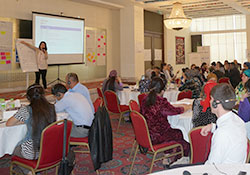Preparing leaders in the disability rehabilitation sector in Tajikistan

WHO/Mishra Satish
The Government of Tajikistan adopted the National Programme on Rehabilitation of Persons with Disabilities (2017–2020) in October 2016. Effective leadership and management will help build the foundation for the National Programme’s aim of creating an enabling environment with equal opportunities for all through improvement of health and social protection of people with disabilities, including their social and medical rehabilitation.
The WHO disability rehabilitation team in Tajikistan, in collaboration with representatives of Management Sciences for Health, conducted a course on leadership, management and governance in Dushanbe, Tajikistan on 17–27 April 2017. The two-week course was joined by 125 participants from the Ministry of Health and Social Protection, the Institute of Public Administration and various nongovernmental organizations involved in implementation of the National Programme.
The first week of the course supported participants in playing a governing role in implementation of the National Programme by establishing shared direction, encouraging engagement with stakeholders, promoting stewardship of resources and cultivating accountability. In the second week, the course assisted implementers of rehabilitation services to use leadership and management practices to improve their service delivery.
This course will ensure that management practices are aligned with the National Programme, the progress of implementer teams is monitored, and that leadership and management capacity are developed, as an essential strategy for establishing an effective enabling environment for better population health.
The initiative is part of a disability rehabilitation programme implemented by the Ministry of Health and Social Protection, with technical support from WHO and financial support from the United States Agency for International Development (USAID) through the Leadership, Management and Governance project.



